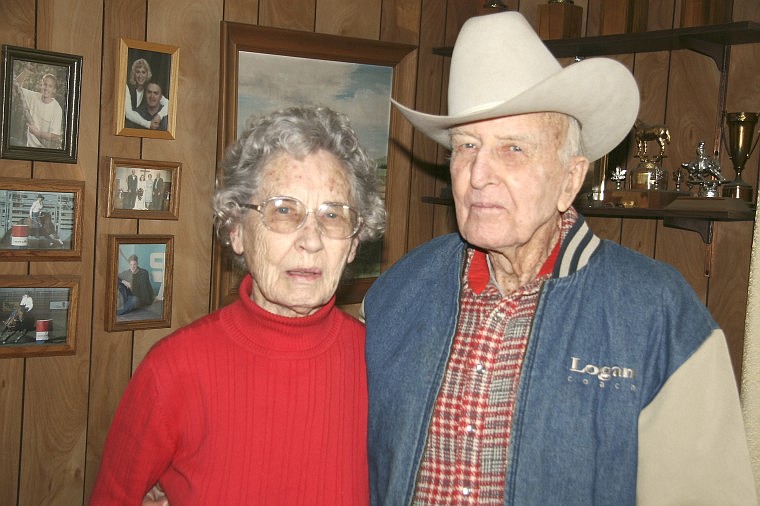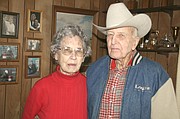Ridin' and ropin'
HAYDEN - George Richmond took it a little easier on Saturday.
It wasn't until late morning when he finished up a few chores outside the home he shares with his wife, Alberta, and a couple of horses, then went inside and got dressed for lunch.
Not just any lunch - it was a commemoration of his 90th birthday, with several generations of the family heading out for a day of celebration at a nearby restaurant, followed by some quality time at home.
For most of his nine decades, Richmond has lived the rodeo life, winning countless awards for roping and training horses. But there is always work left, even on a small ranch.
"There is still a lot to do," he said. "We have nine acres left."
Oh, and during the summer months, "I rope as much as I can."
Richmond was born in Alberta, Canada, on Feb. 6, 1920. At age 8 he went to his first rodeo, and was hooked.
"I saw a really good trick roper," he said. "I was raised on a ranch, and just wanted to become a roper."
By age 9 the family had moved to Montana, and as a kid Richmond rounded up his family's cattle, and his neighbors, just to perfect his roping skills. At 16 he won his first amateur competition. By then the country was in the middle of The Great Depression, and the family could not afford to send him to high school.
Instead, he went to Elko, Nev., to work on a ranch, and soon after won that first event.
"That of course was addictive," he said.
Those skills followed him to World War II, and he worked with an Army cavalry unit at Fort Robinson, Neb., where horses and mules were kept for the still-existing horse soldiers scattered around the world.
He had been there for six months before the base commander, a colonel, discovered his skills and got him designated as essential to prevent him from being shipped off. The colonel allowed Richmond to participate in nearby rodeos and to train and use one of the Army's horses.
"At that time I was roping pretty good," Richmond said.
Good enough that the colonel also let him build a roping arena on the post. He never got past the rank of corporal, but developed a strong relationship with that commander.
"The old colonel became a great friend of mine," he said. "When he was 90 he invited me to his party. It's unusual for a commanding officer to invite an enlisted man to their party."
But that's the nature of the sport, he said. In the middle of an interview, his phone rings. It's an old friend from Billings, Mont., to whom he long-ago taught his skills, calling to wish him happy birthday.
"This could go on a while," Alberta said.
But it's only a few minutes, and the conversation turns to what's natural for old ropers.
"If it wasn't so muddy we could rope outside," Richmond says.
That's one thing about rodeo - they're kind of like family, he said later. And word gets around, like it did a few years ago when he fell off one of his horses and hurt his neck and shoulder.
"I call it the moccasin telegraph," Richmond said. "It works pretty good."
He got calls from all the usual Western rodeo areas like Alberta and Texas, and even from the East Coast, wishing him well.
"That's just the way rodeo people are," Richmond said.
Another thing happened to Richmond while working horses for the Army. During a USO show, he met his wife, coincidentally with the same name as his home province, and within six months, on June 1, 1946, they were married.
"It was his personality more than his roping skills," she said.
And it was Alberta, his wife, who made so much of the life he's lived in the ensuing years possible.
Through all those seasons, and countless competitions that kept him away from home most summer weekends, she kept the home fires burning.
"Alberta was with me for 64 years," he said. "She has been the one who held everything together. My wife was here, taking care of four children. Being a rodeo wife is not an easy thing. She came from real pioneer stock."
In 1960 the family moved to the Hayden ranch. Their children were raised there, and grandchildren spent many hours there.
He trained and bred horses and taught roping, but roping was his way of life.
"Rodeo made our living," he said. "It helped pay for this place."
Two of his sons followed him into equestrian activities, as did two granddaughters.
"I had a pony or a horse since I was 3 years old," said granddaughter Lynn Rodriguez, daughter of the Richmonds' son Lee. "I was probably born on one."
Her grandfather picked her up after school in Post Falls in junior high, and taught her roping. At age 12, she entered her first competition with him, and the family tradition continues. She still competes in roping and barrel racing, largely because of his love for the sport.
"He gave me my first horse in my name," Rodriguez said.
He was a patient teacher, too, she said, only getting irritated with her when she did something unsafe.
"Horses, cattle, ropes - a lot of things can go wrong," she said.
Alberta was never too concerned, as the dangers of roping are less than some other rodeo activities, but one accident with a rope did cost him part of his right thumb.
When George turned 80, his family thought he might retire. Instead he went on to the finals at the Pendleton (Ore.) Roundup - at age 85.
Big belt buckles are the most prominent trophy awarded to rodeo winners, and on his 90th birthday he chose his 1996 Pendleton Gold Card Steer Roping buckle, which he won at age 76.
He laughs when asked how many events he competed in.
"I lost track," he said.
Rodeo is not like other sports, he said. Entrants pay their own way to events, plus entry fees. They don't have to win, just place to get into the money spots, but it doesn't happen every time.
"It's a hard way to make an easy living," Richmond said.



